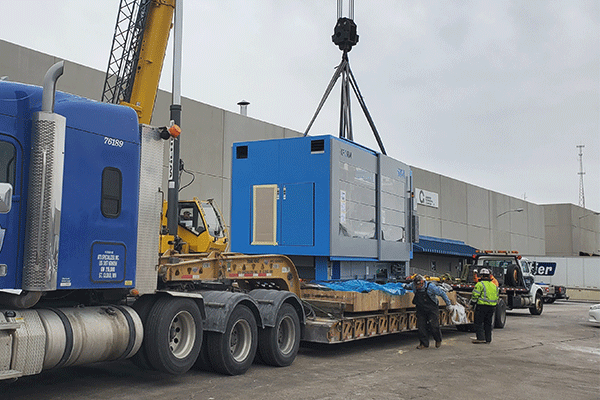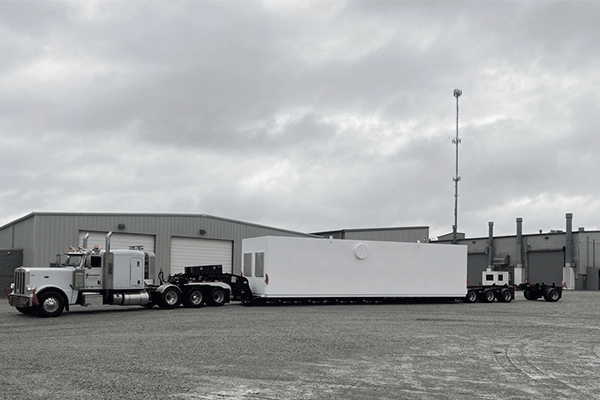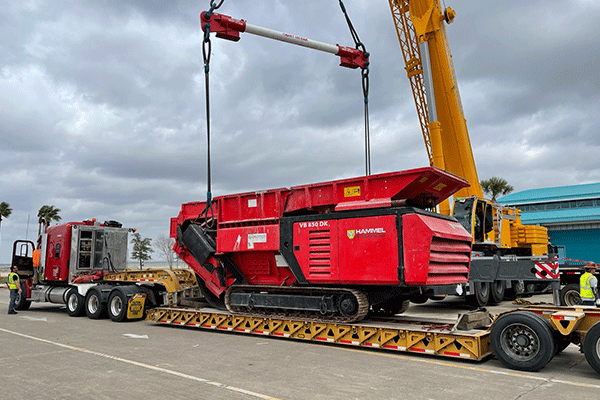You’ve put in the time.
You’ve worked out all the kinks in your shipments to make sure that you’re paying the best possible price for your freight, or so you thought…
On review, you realize that you’re consistently missing the mark, overextending your budget and harming your bottom line all because you didn’t factor in loading time. And so, you’re looking for more information on how loading times weigh into the final price you pay for your shipment.
Luckily, you’re in the right place.
Here at ATS, a lot has changed in the trucking industry since our humble beginning in 1955. If there’s one thing that has remained the same though, it’s the fact that loading a truck still takes time. And, this timing directly impacts the price you pay.
Below, we’ll break down why loading times matter, how they impact the price you pay and give you some tactics for how you can avoid paying more than necessary.
At its conclusion, this blog will leave you with a far better grasp of how lethargic loading times can be detrimental to a business so that you can make sure they don’t impact yours.
Why Do Loading Times Matter?
As an industry insider, you know time is money. When a truck shows up to haul your freight, the amount of time it takes to get your freight safely loaded, directly impacts your bottom line.
Often, carriers plan their loads out days in advance and any long-term delay due to loading time on a shipper's part not only impacts the carrier but the other loads on their schedule. Suffice it to say: a costly delay on the part of one shipper sends a spotlight of injury along any supply chains adjacent to that carrier.
It should be noted that not all carriers will agree to move freight for a shipper who doesn’t stick to their promised loading times. Needless to say, shippers who are consistently running behind with their loading times don’t last very long in an industry powered on the fuel of relationships.
How Do Loading Times Impact the Price You Pay?
For the most part, the monetary penalties shippers incur due to drawn-out loading times can be broken down into these two categories:
- Prolonged delays due to hours of service (HOS) regulations
- Accessorial charges
Hours of Service (HOS) Regulations
Drivers are allowed to be actively on duty for only 14-hours within a 24-hour time frame. Their clock doesn’t stop while they’re sitting in limbo waiting for their trailer to be loaded. As such, the more time a driver spends sitting stagnant in your loading facility, the less time they’re able to spend transporting your freight.
Generally, carriers plan their route before picking up a shipper's load. They do this to stay on top of their HOS requirements so they can adequately service a shipment. Although good carriers plan a bit of time into their schedule for loading time, any delay of more than 2-hours starts to become an issue.
As you may suspect, when a driver goes over their HOS hours due to an unprepared shipper, it’s a big swing. Since the FMCSA stipulates that a driver needs to rest for 10 straight hours following their 14-hour window of on-duty time, everyone needs to wait while their clock resets.
This, in turn, ends up costing the shipper money as they struggle to hold up their commitment to their customer. If deadlines are tight, a shipper may have to pay more money to find a driver willing and able to power only their shipment.
Accessorial Charges
Accessorial charges are fees paid by a shipper on top of their originally quoted rate. Note, these charges are often avoidable providing shippers plan ahead for their freight.
Four charges that are commonly associated with drawn-out loading times are:
1. Detention Fees
A fee that is applied to any shipment that — at a truck’s arrival — isn’t finished loading for a period measuring greater than 2 hours. This type of fee, which typically runs $50-$75/hour, serves to properly compensate drivers for the HOS time they lose out on by waiting for a shipper.
Note, if extended loading times are prearranged between the shipper/receiver and carrier, say at 4 hours, detention fees aren’t charged.
2. Layover Fees
Similar to a detention fee, this $250-$500 charge is levied when a trailer is left in the hands of an unprepared shipper for a prolonged period. Although this may seem similar to drop trailer service, unexpected stay periods like this are very disruptive for a carrier and damaging to their relationship with a shipper. As such layover charges can come at a heightened price point.
3. Driver Assist Charges
This $100-$150 fee is given to a driver when they need to help in the loading and unloading of their truck. This fee becomes incredibly avoidable because of the load-at-your-leisure nature of drop trailers which ensure that there are plenty of people around to load the freight when the time comes.
4. Truck Order Not Used (TONU)
A charge that pops up when a shipper orders a truck, but for one reason or another, doesn’t end up using the truck that was ordered. Concerning loading times, this charge will come into play if a carrier is on their way to a shipment but a shipper decides that - due to a supply chain delay on their end- they aren’t ready for the truck to be loaded.
Note, this $200-$600 TONU charge will typically only be levied if a carrier isn’t notified of a cancellation 24 hours before a truck’s scheduled pick-up date.
How to Avoid Paying More for Your Freight

There are four steadfast ways for you, as the shipper, to avoid paying more for your freight. By employing these tactics before your trucking solution arrives, you’ll be able to make sure you don’t end up overextending your budget due to loading times.
These four methods are:
- Giving the correct shipment information
- Having your shipment ready for transit
- Finding a partner you can rely on
- Giving proper lead time
Giving The Correct Shipment Information
This is crucial. The more accurate information you’re able to give on the specifics of your shipment, the better. This will help to ensure that when your truck does show up, no one is caught off-guard. As such, your truck will show up on time with the equipment type, capacity and HOS needed to service your shipment.
Another aspect of this tactic is to make sure that you give the correct information regarding the pickup and drop-off timing of your freight. If you can educate your transportation partner on the exact timing of your interactions they’ll be better able to serve your needs.
For example:
If you need the full capacity of a dry van to move your pallet-based commodity 400 miles, but you don’t want it to arrive until two days following its pickup date, your loading time doesn’t matter as much to the price you pay.
Although carriers are often less motivated to pick a load they have to sit on for an extended period — time that could be spent hauling another load — a good transportation partner will be able to find a truck to fit your needs.

Do You Need to Schedule an Appointment Time?
Larger businesses who have trucks picking up and dropping off shipments regularly, need to schedule appointment times to better handle, monitor and prepare for each trucks' arrival. As such, it's important that if you’re a shipper or receiver who’s impacted by these limited shipping windows you let your transportation partner know in advance.
Doing so will help to ensure that when your scheduled pick/drop times arrive, your truck will be ready and waiting.
Having Your Freight Ready For Transit
The most effective thing that you can do to make sure that loading times don’t impact your price is to have your freight ready to go and the manpower on-site to get it loaded. To the best of your ability, plan to have your freight ready to load by your truck's arrival time. In some cases, this may not be possible but, if it is, doing so is a shipper’s best bet.
Finding a Partner You Can Rely On
Sometimes, things come up and you’re just not able to load a truck with proper timing. In these instances having a transportation partner you can rely on is key. Find a partner with your best interest in mind who will work with you every step of the way so that when things go wrong, the damage to your bottom line is blunted by their expertise and guidance.
These partners will create an open line of communication between you and your trucking partner so that everyone is on the same page. This helps to make sure that, should loading times become an issue, everyone is on the same page as to why.
Giving Proper Lead Time
In today’s transportation market, capacity is tight. As such, it can be difficult to secure a truck on short notice. This is especially the case when loading times may become an issue. By giving your transportation partner the proper lead time, they will be able to find a truck that is equipped to handle your lane requirements, deadlines and capacity needs.
Do you need drop trailer service to ensure adequate loading time? Providing proper lead time will make this possible. This is especially true in today's shipping industry where trailer shortages make the opportunity cost of dropping a trailer costly to a carrier.

Your Loading Times Matter
If there’s one thing I want you to take away from this article it's this: your loading times matter. This is not only the case for your business, your bottom line and your reputation but the success of this industry as a whole. Today’s transportation market is strapped for capacity. The rising demand is becoming increasingly difficult to meet. Because of this, anything that you, as a shipper, can do to make sure things run smoothly is crucial.
Now that you have a better understanding of why your loading times matter, how they impact the price you pay for your shipment and what you can do to minimize their impact, you’re ready for the next step in your shipping journey.
Read our blog on how the distance your freight travels impacts your price. Our goal here at ATS is to educate you so that you can make the best decisions possible for your business.
As always, please reach out to us with any questions you may have. You bring the questions, we’ll bring the answers.





